Text
8th Meeting, 15th Session of the Expert Group on Resource Management.
Session 4: Decision Support – 2
Chair: Karen Hanghøj
Agenda item 7.2: Development and deployment of UNFC - Groundwater Resources Working Group Update (ECE/ENERGY/GE.3/2024/7)
Peter van der Keur, Chair, Groundwater Resources Working Group and Geological Survey of Denmark and Greenland (GEUS)
UNFC Application to Renewable Energy
Gioia Falcone, Co-Chair, Renewable Energy Working Group
Recycling construction materials
Julia Stegemann, Professor of Environmental Engineering, University College London, UK
Sand and construction materials
Tom Bide, Senior Scientific Officer, British Geological Survey
AMREC-PARC Case study
Bob Felix Occiti, Senior Policy Officer - Research Oil and Gas Program, African Energy Commission
Joint UNFC – PRMS Financial Reporting Template
Victor Babashev, Chair, Petroleum Working Group and Ignatiy Volnov, Regional Director Russia and Caspian, Society of Petroleum Engineers
Discussions Agenda item 6: Responsible resource governance: Development and deployment of UNRMS - Critical Minerals Markets Information System (CriMMIS) Concept
Simon Strickland, Senior Adviser on Strategy, Cabinet Office, UK
Transparency in Critical Raw Material Value Chains
Elisabeth Tuerk, Director, Economic Cooperation and Trade Division, UNECE
Circular Metals
Brian Cantor, Director, UK ICE-SRM for Circular Materials, BCAST, Brunel University, UK
UNRMS: Considerations for Steel Recycling
Cameron Pleydell-Pearce, Director, SUSTAIN Steel Hub, Swansea University, UK
Ukraine: Resource management challenges and opportunities
Roman Opimakh, Director General, Ukrainian Geological Survey
Activities of the UNECE Hydrogen Task Force
Branko Milicevic, UNECE
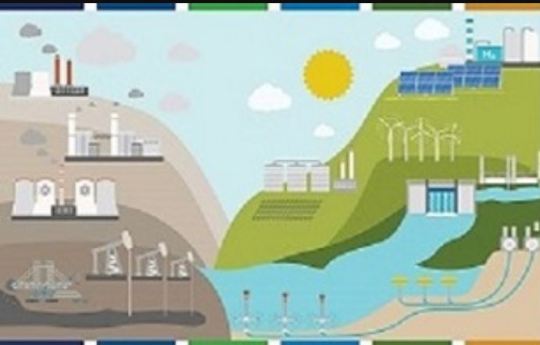
#resource management#expertgroup#extractiveindustries#egrm15#United Nations Resource Management System (UNRMS)#United Nations Framework Classification for Resources (UNFC)#Assuring sustainability in resource management#Expert Group on Resource Management#industrial water#mining wastes#sustainable water management#sustainable energy
0 notes
Text
7th Meeting, 15th Session of the Expert Group on Resource Management.
The UNECE Resource Management Week 2024, including the 15th session of the Expert Group on Resource Management (EGRM-15), will be held at the Palais des Nations in Geneva, Switzerland, 22-26 April 2024. Leaders, experts, and stakeholders in resource management will gather to discuss sustainable development challenges and opportunities. Our theme, "Assuring sustainability in resource management", will focus on the United Nations Framework Classification for Resources (UNFC) and the United Nations Resource Management System (UNRMS) and their pivotal role in resource management worldwide.
Agenda highlights:
Seminars, Workshops, and Short Courses: Focusing on the UNFC and UNRMS as catalysts for transforming raw materials management.
Minerals for the Energy Transition: Highlighting the work of the UN Working Group on Transforming Extractive Industries for Sustainable Development.
Responsible Resource Management: The development and deployment of UNRMS.
Navigating the Future: Exploring various applications of UNFC.
Building capacity: International Centres of Excellence on Sustainable Resource Management.
Empowering Sustainability: Discussing global initiatives and case studies.
Lunchtime lectures: Professor Peter Hopkinson, Co-Director, Exeter Centre for the Circular Economy, Exeter University, and Professor Markus Zils, Circular Economy and Management Science, University of Exeter Business School, UK, on Circular Data (23 April) and Sarah Gordon, CEO, Satarla on The beauty of interconnected natural resource ecosystems, with a focus on ESG issues (25 April).
Session 3: Responsible resource governance
Chair: Karen Hanghøj
Agenda item 8: Building Capacity: International Centres of Excellence on Sustainable Resource Management
ICE-SRM Russia – Igor Shpurov and Vera Bratkova, Chief Executive Officer
ICE-SRM UK – Nick MacInnes, Circular Economy Lead, Office of the Chief Scientific Adviser, Department for Environment, Food and Rural Affairs (Defra), UK and Lynsay Blake, Head of Science in Resources and Waste, Defra, UK
ICE-SRM Mexico – Ulises Neri, Executive Director & Ministries of Energy and Economy of Subnational Governments of Mexico:
José Ramón Silva - Secretary of Energy Development of the State of Tamaulipas
Carlos Adrian García Basto - Director General of the State Energy Agency of the State of Campeche
Esaú Garza - Secretary of Economy, Science and Technology of the State of Aguascalientes
ICE-SRM Criteria for Recognition and Terms of Reference (ECE/ENERGY/GE.3/2024/4)
ICE-SRM EU – Meta Dobnikar, Head of Mineral Resources and Geochemistry Department, Geological Survey of Slovenia
ICE-SRM Central Asia – Farkhat Abytov, Executive Director
ICE-SRM Africa – Tunde Arisekola, Senior Advisor, Geological and Minerals Information, African Minerals Development Centre
Dario Liguti, Director, UNECE Sustainable Energy Division
Discussion
Agenda item 7.2: Development and deployment of UNFC - Technical Advisory Group Annual Report - Updated Injection Projects Specifications (ECE/ENERGY/GE.3/2024/9)
Aleksandr Shpilman, Co-Chair, Technical Advisory Group
Serge Van Gessel, Chair, Injection Projects Working Group and TNO
Agenda item 7.2: Competency in resource management
Vitor Correia, Chair, Competency Working Group, EGRM
Michael Neumann, Global Geoscience Professionalism Group
Gbenga Olugbenga Okunlola, President, Geological Society of Africa and Member, AMREC Working Group
Craig Waldie, Ontario Securities Commission, Canada - presentation to be delivered by Hendrik Falck, Chair, EGRM Minerals Working Group
Watch the 7th Meeting, 15th Session of the Expert Group on Resource Management

#resource management#plenary sessions#expert group#palais des nations#minerals#mining#mineral resources#geochemistry#mineral development#sustainable energy#sustainability#energy transition
0 notes
Text
3rd Meeting, 15th Session of the Expert Group on Resource Management.
Session 3: UNFC Minerals and Anthropogenic Resources Practitioners' Forum
Chair and Moderator: Erika Ingvald, EGRM Vice-Chair, Geological Survey of Sweden (SGU)
Panel 1: Adoption of UNFC
Adoption of UNFC – Matthias Hartung, Chair, UNFC Adoption Group, EGRM Commercial Applications Working Group
Expanding the Metrics – Sigurd Heiberg, Chair, EGRM Commercial Applications Working Group
G-axis – Alistair Jones, Chair, EGRM G axis Task Force
Discussion and audience intervention
Panel 2: Challenges in Classifying Primary Raw Materials
Hendrik Falck, Chair, EGRM Minerals Working Group
UNFC Expert Estimation – Tom Bide, Senior Scientist, British Geological Survey (BGS)
New to UNFC – Tania Martins, Chief Geologist, Manitoba Geological Survey
Basics of Estimation – Garth Kirkham, Chairperson, Committee for Mineral Reserves International Reporting Standards (CRIRSCO)
Discussion and audience intervention
Panel 3: Challenges in Classifying Secondary Raw Materials
Ulrich Kral, Chair, EGRM Anthropogenic Resources Working Group and Environment Agency Austria
UNFC inventory for mining and metallurgical residues – Soraya Heuss-Aßbichler, Professor, University of Munich (LMU)
Financing Secondary Raw Materials Projects on industrial scales – Massimo Gasparon, Director, European Raw Material Alliance (ERMA)
National Project Portfolio for CRM recovery from waste flows – Daniel Monfort, Geologist Engineer & Project Manager, French Geological Survey (BRGM)
Discussion and audience intervention
Panel 4: Consistency and Quality Assurance in Classifying
Slavko Solar, Economic Affairs Officer, Sustainable Energy Division, UNECE
Consistency – Meta Dobnikar, Head of Unit, Geological Survey of Slovenia
Quality Assurance – Alistair Jones, Chair, EGRM G-axis Task Force
UNFC in higher education – Jari Joutsenvaara, Project Coordinator, University of Oulu
Discussion and audience intervention
Watch the 3rd Meeting, 15th Session of the Expert Group on Resource Management!
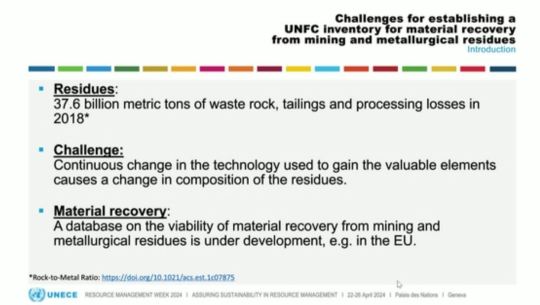
#resource management#expertgroup#extractiveindustries#egrm15#United Nations Resource Management System (UNRMS)#United Nations Framework Classification for Resources (UNFC)#Assuring sustainability in resource management#Expert Group on Resource Management#industrial water#mining wastes#sustainable water management#sustainable energy
0 notes
Text
1st Meeting, 15th Session of the Expert Group on Resource Management.
The UNECE Resource Management Week 2024, including the 15th session of the Expert Group on Resource Management (EGRM-15), will be held at the Palais des Nations in Geneva, Switzerland, 22-26 April 2024. Leaders, experts, and stakeholders in resource management will gather to discuss sustainable development challenges and opportunities.
#resource management#expertgroup#extractiveindustries#egrm15#United Nations Resource Management System (UNRMS)#United Nations Framework Classification for Resources (UNFC)#Assuring sustainability in resource management#Expert Group on Resource Management#industrial water
0 notes
Text
6th Meeting, 15th Session of the Expert Group on Resource Management.
Session 2: Decision Support - 1
Chair: David MacDonald
Agenda item 7.1: Social and environmental considerations
Carrie McClelland, Chair, Social and Environmental Considerations Working Group and Colorado School of Mines
Classifying the production of lithium, caesium and tantalum from the Tanco Mine, Manitoba, Canada, according to UNFC – A Case Study (ECE/ENERGY/GE.3/2024/12)
Tania Martins, Chief Geologist, Manitoba Geological Survey
Wintershall Dea - UNFC-UNRMS Case study
Matthias Hartung, Chair, UNFC Adoption Group and Wintershall Dea
Fraguva Energy (SME) - UNRMS Case Study
Gaspar Franco-Hernandez, Deputy Director of Planning and Strategic Regulation, Fraguva Energy
Why investment is needed NOW on both "ends" of the Critical Raw Materials circularity ring - and how UNRMS can help
Christophe Xerri, President and Senior Consultant, The Sailing Brain Consulting
Resource Management Young Member Group (EGRM-15/2024/INF.2) -
1. Critical Minerals for the Sustainable Energy Transition: A Guidebook to Support Intergenerational Action – Official Launch
Bianca Derya Neumann (Moderator), Chair, Resource Management Young Member Group (RMYMG)
Jodi-Ann Wang, Project Lead, RMYMG and Policy Analyst, LSE Grantham Research Institute
Vadim Kuznetsov, Project Lead, RMYMG and Director, Sustainability and Climate Initiatives, BRICS Youth Energy Agency
Gabriele Romeo, Master's student of International Energy Transitions, Paris School of International Affairs, Sciences Po
Radia Sedaoui, Chief of Energy Section, Climate Change and Natural Resource Sustainability Cluster, UNESCWA
2. Panel: Driving Intergenerational Justice in Critical Raw Materials Management: Potential of Demand-side Solutions
Bianca Derya Neumann (Moderator), Chair, Resource Management Young Member Group
Diego Marin, Policy Officer for Raw Materials and Resource Justice, Policy Division, European Environmental Bureau
Gyubin Hwang, Global Coordinator of the Children and Youth Major Group to UNEP
Natalia Mrówczyńska, Board Member, ReGeneration 2030
Watch the 6th Meeting, 15th Session of the Expert Group on Resource Management!
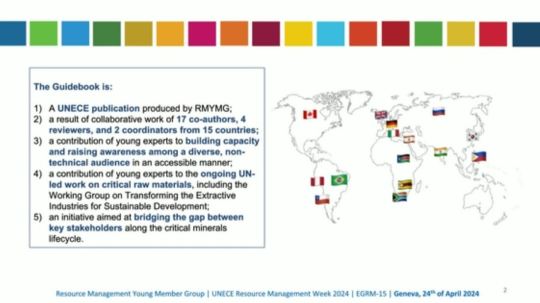
#resource management#expertgroup#extractiveindustries#egrm15#United Nations Resource Management System (UNRMS)#United Nations Framework Classification for Resources (UNFC)#Assuring sustainability in resource management#Expert Group on Resource Management#industrial water#mining wastes#sustainable water management#sustainable energy
0 notes
Text
5th Meeting, 15th Session of the Expert Group on Resource Management.
The UNECE Resource Management Week 2024, including the 15th session of the Expert Group on Resource Management (EGRM-15), will be held at the Palais des Nations in Geneva, Switzerland, 22-26 April 2024. Leaders, experts, and stakeholders in resource management will gather to discuss sustainable development challenges and opportunities.
The UNECE Resource Management Week 2024, including the 15th session of the Expert Group on Resource Management (EGRM-15), will be held at the Palais des Nations in Geneva, Switzerland, 22-26 April 2024. Leaders, experts, and stakeholders in resource management will gather to discuss sustainable development challenges and opportunities. Our theme, "Assuring sustainability in resource management", will focus on the United Nations Framework Classification for Resources (UNFC) and the United Nations Resource Management System (UNRMS) and their pivotal role in resource management worldwide.
Agenda highlights:
Seminars, Workshops, and Short Courses: Focusing on the UNFC and UNRMS as catalysts for transforming raw materials management.
Minerals for the Energy Transition: Highlighting the work of the UN Working Group on Transforming Extractive Industries for Sustainable Development.
Responsible Resource Management: The development and deployment of UNRMS.
Navigating the Future: Exploring various applications of UNFC.
Building capacity: International Centres of Excellence on Sustainable Resource Management.
Empowering Sustainability: Discussing global initiatives and case studies.
Lunchtime lectures: Professor Peter Hopkinson, Co-Director, Exeter Centre for the Circular Economy, Exeter University, and Professor Markus Zils, Circular Economy and Management Science, University of Exeter Business School, UK, on Circular Data (23 April) and Sarah Gordon, CEO, Satarla on The beauty of interconnected natural resource ecosystems, with a focus on ESG issues (25 April).
Session 1: Reshaping Resource Management: Embracing Novel Challenges, Prospects, and Innovative Solutions
Chair: David MacDonald
Keynote: Empowering equality: Gender and social justice in artisanal and small-scale mining and resource management - Anna Nguno, Deputy Director, Geological Survey of Namibia, Ministry of Mines and Energy
Keynote: Financing a just transition in the extractives sector - Jodi-Ann Wang, Policy Analyst, LSE Grantham Research Institute, Just Transition Finance Lab
Agenda item 5: Update on the UN Secretary-General's Panel on Critical Energy Transition Minerals Collaboration for Critical Raw Materials: Activities of the Working Group on Transforming the Extractive Industries for Sustainable Development - Minerals for the Energy Transition: Transforming the Extractive Industries for Sustainable Development
Moderator: Gioia Falcone, Vice-Chair, EGRM
Maria José Baptista, Interagency and Intergovernmental Affairs Officer, UNEP
Panel
Djaheezah Subratty, Head, Consumption and Production Unit, UNEP
Xunpeng Shi, Consultant, UNESCAP
John Sloan, Economic Affairs Officer, UNECA
Radia Sedaoui, Chief of Energy Section, Climate Change and Natural Resource Sustainability Cluster, UNESCWA
Rodrigo Furtado Messias, Associate Economic Affairs Officer, Non- renewable Resources Unit, Natural Resources Division UNECLAC
Clovis Freire, Chief, Commodities Research and Analysis Section, UNCTAD
Hari Tulsidas, Technical Advisor, Sustainable Energy Division, UNECE
Discussions, Q&A
Watch the 5th Meeting, 15th Session of the Expert Group on Resource Management.

#resource management#expertgroup#extractiveindustries#egrm15#United Nations Resource Management System (UNRMS)#United Nations Framework Classification for Resources (UNFC)#Assuring sustainability in resource management#Expert Group on Resource Management#industrial water#mining wastes#sustainable water management#sustainable energy
0 notes
Text
4th Meeting, 15th Session of the Expert Group on Resource Management.
UNRMS: Shaping the Future of Resource Management
Chair and Moderator - Teresa Ponce de Leão, EGRM
Introduction to UNRMS - Teresa Ponce de Leão, Chair, UNRMS Subgroup
Welcome and Objectives
Overview of UNRMS
Importance in Sustainable Development
Module 1: UNRMS Framework - Frances Wall, Professor of Applied Mineralogy, Camborne School of Mines, University of Exeter & Hari Tulsidas, Technical Advisor, Sustainable Energy Division, UNECE
Principles and Structure
Resource Classification and Management
UNRMS and SDG impacts
Interactive Q&A
Module 2: UNRMS in Action - Case Studies - Eva Marquis, Met4Tech Research Fellow, Camborne School of Mines, University of Exeter & Ulises Neri, Executive Director, ICE-SRM Mexico and Latin America
UK: Circular Approach
Woodside- UNRMS- Study Case
Interactive Q&A
Module 3: Advanced Technologies for a Circular Economy - Teresa Ponce de Leão, Chair, UNRMS Sub-group & Julian Hilton, SDGs Delivery Working Group
AI and Blockchain Applications
Disruptive Technologies Driving the Circular Economy
Resource Servitization and Its Role in Sustainability
Interactive Q&A
Module 4: Critical Raw Materials and UNRMS - Xunpeng Shi, Consultant, ESCAP & Simone Manfredi, Raw Materials Information System (RMIS) Project Leader, Joint Research Centre (JRC)
Understanding CRMs and their significance
UNRMS approach to managing CRMs
RMIS for effective resource tracking and decision-making
Interactive Q&A
Module 5: Impact Assessment - Michael Musialike, Copperbelt University and Mubanga Mutale of the Geological Survey of Zambia & Diana Ruiz, Chief of Exploration, Extraction and Processing, LitioMx
Zambia: Application in Mining and Development
LitioMX, Mexico
Assessing Environmental, Social, and Economic Impacts
Interactive Q&A
Conclusion and Wrap-Up - Teresa Ponce de Leão & Hari Tulsidas
Recap of Key Takeaways
Open Forum for Final Questions
Course Feedback and Closing Remarks
Watch the 4th Meeting, 15th Session of the Expert Group on Resource Management.
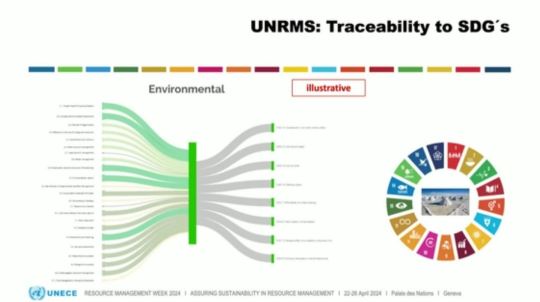
#resource management#expertgroup#extractiveindustries#egrm15#United Nations Resource Management System (UNRMS)#United Nations Framework Classification for Resources (UNFC)#Assuring sustainability in resource management#Expert Group on Resource Management#industrial water#mining wastes#sustainable water management#sustainable energy
0 notes
Text
2nd Meeting, 15th Session of the Expert Group on Resource Management.
Session 2: Updates on UNFC Implementation in Europe and Beyond.
Moderators: Ghadi Sabra, Politecnico di Torino
UNFC Developments and Progress
UNFC Progress in mining wastes – Ronald Arvidsson, Senior Geophysicist, Geological Survey of Sweden (SGU)
Development and Application of a UNFC-Compliant Classification Methodology for Aluminum Scrap Recovery Projects - Marina von Vietinghoff-Scheel, German Minerals Agency, German Geological Survey (DERA, BGR)
UNFC Progress in end-of-life secondary raw materials – Iman Dorri, Scientific Researcher, University of Munich (LMU)
UNFC Progress in classifying investment projects within European Raw Material Alliance (ERMA) – Massimo Gasparon, Director, ERMA
UNFC in Horizon Europe (HE) Projects
SEMACRET project and UNFC resource mapping of selected CRM in Europe – Blažena Wertichová, Researcher and Development Specialist, Czech Geological Survey
VECTOR - assessing the practicality of UNFC reporting through the integration of social science and geoscience – Sarah Gordon and Chris Stockey, Satarla, UK
AGEMERA – University Courses: UNFC as Reporting Standard in Raw Material Sector – Md Ariful Islam, Scientific Assistant, Chair for Underground Mining Methods, Institute of Mining and Special Civil Engineering TU Bergakademie Freiberg
CIRAN - Reconciliation of Conflicting Societal Objectives: Nature Protection vs. Mining - Vitor Correia, Secretary-General, International Raw Materials Observatory (INTRAW)
Bridging from different National and International Systems to UNFC
Hungarian Experience - Zoltán Horváth, Head of Department, Geological Survey of Hungary (SZTFH)
Czech Republic Experience – Zbyněk Gabriel, Research and Development Specialist, Czech Geological Survey
French Experience - Daniel Monfort, Geologist Engineer & Project Manager, French Geological Survey (BRGM)
Ukrainian Experience – Stanislav Lytvyniuk, Deputy Chairman, State Commission of Ukraine on Mineral Resources
United Kingdom Experience - Tom Bide, Senior Scientist, British Geological Survey (BGS)
CRIRSCO Template-UNFC Bridging – Hendrik Falck, Chair, EGRM Minerals Working Group, and Geology and Royal Policy Manager, Geoscientists Canada, Government of the Northwest Territories (GNWT) (ECE/ENERGY/GE.3/2024/5 and Guidance Note)
Watch the 2nd Meeting, 15th Session of the Expert Group on Resource Management!

#resource management#expertgroup#extractiveindustries#egrm15#United Nations Resource Management System (UNRMS)#United Nations Framework Classification for Resources (UNFC)#Assuring sustainability in resource management#Expert Group on Resource Management#industrial water#mining wastes
0 notes
Text
In a changing world that is facing multiple challenges, Water Engineering stands out as one of the main transforming tools for building a better world.

How to guide the hydro-environment community in this journey?
#hydroinformatics#iceengineering#hydro-environment community#watersector#WaterEngineering#fluvial hydraulics#coastal hydraulics#maritime hydraulics#ecohydraulics#climate change mitigation#climate change adaptation#IAHR#UN-Water#WERI#UN-SPIDER
0 notes
Text
How innovative companies are navigating the invisible water crisis?
The World Bank has labelled water quality problems as an “invisible water crisis” due to a lack of proper monitoring and elusive detection. Traditionally, media attention has focused on water quantity: either too much water, leading to floods, or too little water, leading to droughts. Water quality, in comparison, receives notably less attention. Its effects are broader, more profound, and less predictable than previously understood, necessitating immediate and focused concern.
Whichever way you look at it, water is at the centre of the climate crisis. The crisis is preventing the achievement of the United Nations’ Sustainable Development Goals, as severe water quality issues continue to persist in some regions. Globally, over 3.5 billion inhabitants experience some degree of water scarcity. To tackle this, substantial investments are needed to enhance clean water infrastructure throughout the entire value chain.
By 2050, over 5 billion people will live in areas affected by water scarcity.
Innovative companies are finding solutions, but more investment is needed.
The Zero Water Waste Challenge, part of UpLink and HCL’s Aquapreneur Innovation Initiative, is calling for innovative solutions that boost freshwater conservation around the world.
#water crisis#sdg6#Climate goals#water goals#investment#Zero water waste challenge#world bank#sustainable development goals#water scarcity
0 notes
Text
UN DESA Global Policy Dialogues to Turbocharge SDG Implementation - Session 1: Accelerating Clean Water and Energy for All: Exploring SDGs 6 and 7.
Halfway into the mandate of the 2030 Agenda for Sustainable Development, the world continues to face challenges including the socioeconomic effects of the pandemic, the climate crisis and global conflicts, that are together exposing and exacerbating global inequalities and setting back hard-earned development progress. Our collective aim of realizing the 17 Sustainable Development Goals (SDGs) by 2030 is at risk.
The UN DESA will host two Global Policy Dialogues in June (20 June and 22 June) to discuss ways to strengthen the interlinkages between the Goals under review and present the information in an interactive format for a wide audience.
Both events will feature speakers from United Nations leadership, Member States, the United Nations High-level Advisory Board on Economic and Social Affairs, and the Independent Group of Scientists preparing the Global Sustainable Development Report 2023. Each discussion will include ways to build and scale partnerships to reach our targets.
With these two dialogues, UN DESA hopes to enhance the preparedness of Member States and the United Nations system to respond to multi-dimensional, systemic risks in today's interconnected world. These dialogues are made possible by the United Nations Peace and Development Trust Fund;
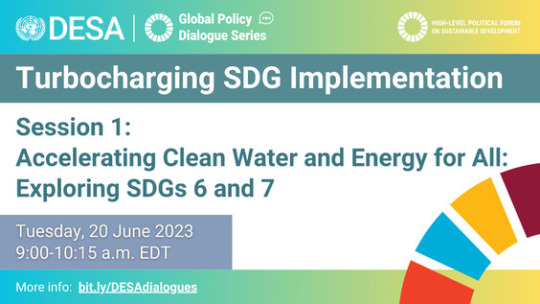
#Independent Group of Scientists#High-level Advisory Board on Economic and Social Affairs#leadership#Member States#Plenary sessions#SDG7#sdg6#Water for all#clean energy for all#United Nations Peace and Development Trust Fund#undesa
0 notes
Text
Regional progress and policy recommendations for SDG7.
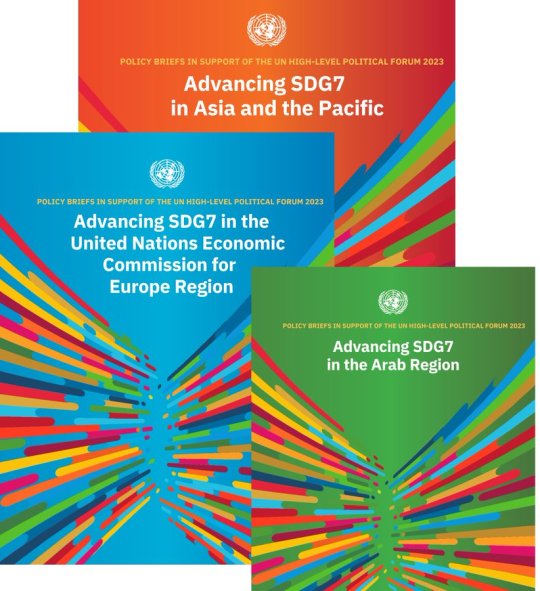
Explore the first three Sustainable Development Goal 7 Policy Briefs, shining a light on regional progress and policy recommendations for "Affordable and clean energy for all "(SDG7) in the Arab region, Asia and the Pacific, and Europe!
#SDG7#Energy#electric power industry#electric power generation#Energy supply#energy consumption#Arab region#Asian Region#European Region#Pacific Region#Caribbean Region#Policy Briefs#regional progress
0 notes
Text
Partnerships and cooperation for water, industry and energy.
Industry has the capacity to advance responsible practices and devise market-based solutions to accelerate progress towards the Sustainable Development Goals (SDGs) at scale.
Collective action, in the form of partnerships and coalitions, increasingly with non-traditional partners, is vital where desired outcomes cannot be obtained through unilateral action alone. Commitment to shared goals and a recognition of the potential for trade-offs between company interests and broader public benefits are essential ingredients of success.
Companies within industries that rely heavily on water for their core business – such as manufacturing of goods or production of inputs and raw materials – have become increasingly attuned to water stress and the risks it poses to business interests. As a result, many companies are exploring and testing ways to reduce or mitigate water risks across their business and supply chains.

Collective actions allow companies to develop new skills and knowledge, such as greater understanding of community needs and values, and enhance their ability to connect with government actors and non-governmental organizations. Industry is in a unique position to lead on the collective action front, being very familiar with strategic partnerships and cooperation and their ability to produce win–win outcomes in core business areas.
In recent years the increased value of adding environmental, social and governance and water stewardship scopes to such arrangements has become very evident – not only in the commercial sense but also in the broader context of overall water sustainability to provide beneficial results for all parties. While leadership by individual companies is necessary to accelerate action toward SDG 6, it is not sufficient to achieve this goal.
Collective action, while not a panacea, is “needed among companies themselves, working together along global supply chains and on a precompetitive basis in specific industry sectors, issues and locations. It will also be needed on a cross-sector basis among companies, governments and civil society organizations”. Businesses anticipating that future in the strategic choices they make today are more likely to thrive and unlock the opportunities that a more environmentally stable and socially inclusive planet can bring.
Industrial water consumption
19% of the world’s freshwater withdrawals is used by industry and energy together
70% of the world’s freshwater use and pollution are caused by 7 major sectors - food, textile, energy, industry, chemicals, pharmaceuticals and mining
17% of total water consumption in high-income countries comes from industrial water withdrawal, while only 2% in low-income countries.
49% of all water consumption in the European Union is meant for industrial production.
Only 4% of water consumption in the Middle East and North Africa is meant for industrial production.
47% of water consumption in South Asia is meant for industrial production, and the region is experiencing high water stress
#Water and Energy#commercial water#industrial water#water supply#SDG7#SDG9#SDG11#SDG13#UNESCO#sustainable energy#rural areas#urban areas#partnerships and cooperation#water management#water partnerships
0 notes
Text
Partnerships and cooperation for water and climate change.
The cross-sectoral nature and interdependence of water and climate change with other vital natural resources, such as land or energy, can create more opportunities for partnerships and cooperation.
Accelerating action through partnerships and cooperation between water and climate stakeholders can create additional benefits to freshwater ecosystems and to the most exposed and vulnerable people, reducing disaster risks, delivering cost savings, fostering job creation and generating economic opportunities.
This requires improving existing partnerships and, in some cases, forging new ones at all levels, from local, national, basin to global, through multi-stakeholder processes. Research and learning institutions, the private sector, and civil society, including youth, women and marginalized groups, play a key role and support efforts to underpin effective government leadership and action.
World Water Development Report 2023 - Partnerships and cooperation for Water and climate change.
#UNESCO#water partnerships#partnerships and cooperation#water#SDG6#water access#water supply#water consumption#Water allocation#Water User Associations (WUAs)#water–energy–food–ecosystem (WEFE) nexus#water and climate change#freshwater ecosystems
0 notes
Text
Partnerships and cooperation for water and the environment.
Co-benefits generated through ecosystem-based approaches provide a strong justification for nature-based solutions that can be effective across the full spectrum of sectors.
Watershed protection or rehabilitation measures are among the oldest of water-related partnerships and typically involve partnerships among land and water managers and users. Experience demonstrates that partners need not all have the same objectives, only a consensus on the action that needs to be taken and a recognition of the importance of sharing benefits and costs.
For example, water utilities may mainly be interested in reducing infrastructure risks, ensuring compliance and reducing costs. Environment interests may be interested in biodiversity benefits. Nature-based solutions can deliver on both simultaneously and cost effectively.
Climate adaptation benefits, such as flood mitigation, are particularly attractive. Water funds are a common means of financing these schemes to support partnerships between cities, businesses, utilities, and land management upstream to improve water quality and/or quantity and generate long-term benefits. Partnerships involving local communities are increasingly used to improve monitoring of the environment through citizen science and are particularly important to address the huge gaps in water quality data.
World Water Development Report 2023 - Partnerships and cooperation for water and the environment.
#industrial water#agricultural water#municipal water#wastewater#waste disposal#environmental sustainability#environmental concerns#water-related partnerships#watershed#local communities#citizen science#water quality data
0 notes
Text
Partnerships and cooperation for water and health.
Weak partnerships between the health and water sanitation and hygiene (WASH) sectors lead to significant losses in efficiencies, despite their obvious interdependencies.
Shockingly, major gaps in basic WASH still exist, with 1.8 billion people using health care facilities that lack basic water services and 800 million using facilities with no toilets.
Progress requires cooperation across a wide range of stakeholders, such as policy-makers, engineers and scientists, health care professionals, veterinarians, farmers, donors, NGOs, and private citizens and corporations.
#water sanitation and hygiene (WASH)#UNESCO#water partnerships#partnerships and cooperation#water#SDG3#SDG6#water access#water supply#water consumption#health care facilities
0 notes
Text
Reallocation through land use change.

The donor region becomes urbanized, leading to a change from agricultural to urban water use as land use changes.
#Donor region#recipient region#rural areas#urban areas#water reallocation#Agricultural systems#urban water systems#water flow#municipal water#agricultural water#water reservoir
0 notes